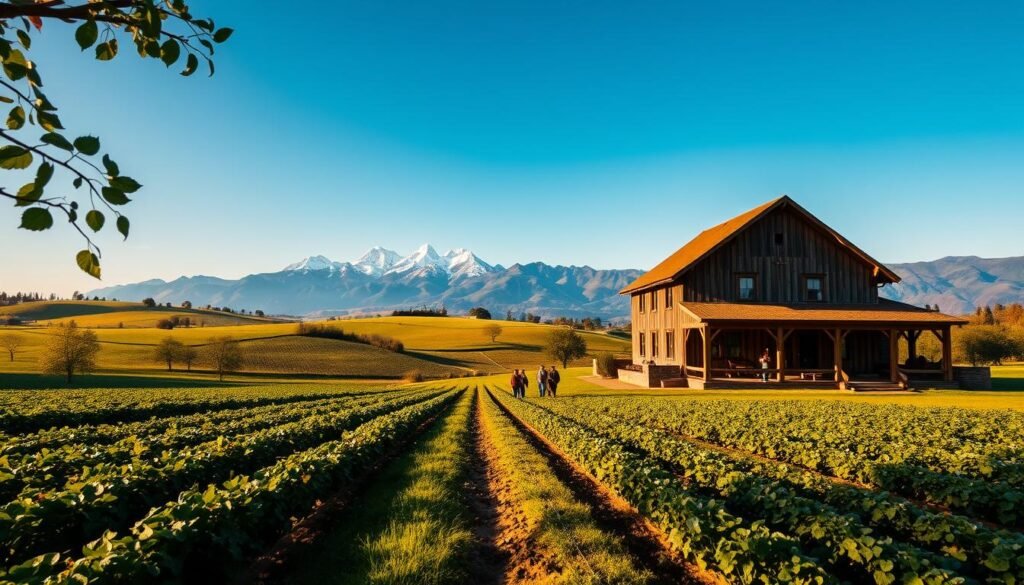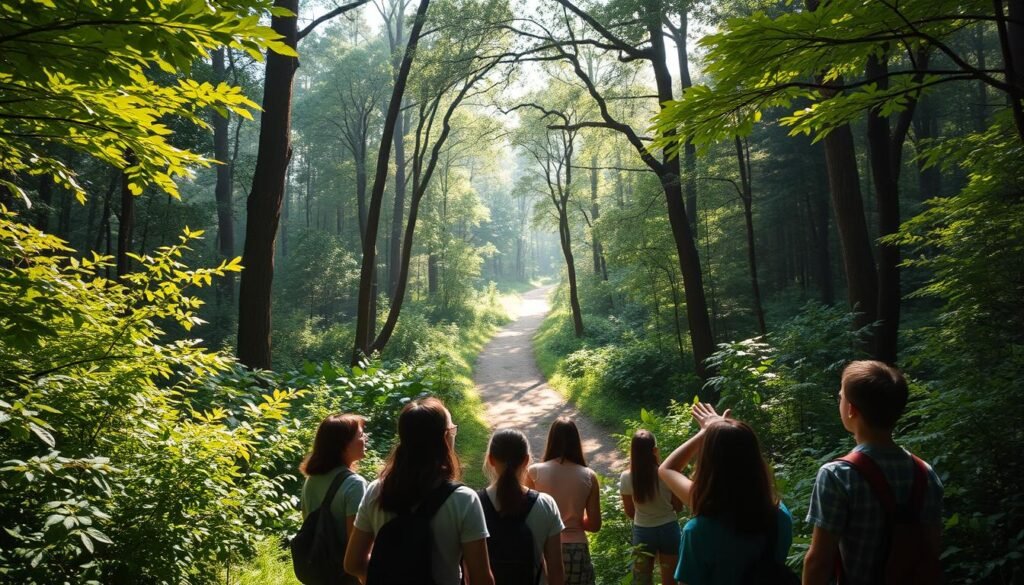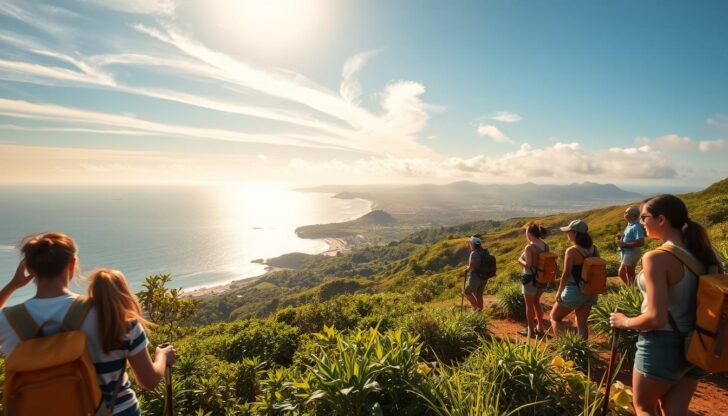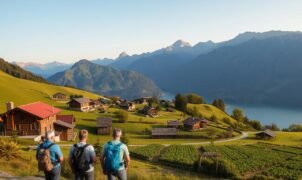The Top Types of Ecotourism
The world faces big challenges like environmental damage. Sustainable travel is key to fixing this. Ecotourism lets travelers see the world’s beauty without harming it.
Eco-friendly tourism helps save nature and supports local people. It teaches us to care for the environment. By choosing ecotourism, we can enjoy nature and help protect it.
Key Takeaways
- Explore the world’s natural wonders while minimizing your ecological footprint
- Support local communities through eco-friendly tourism initiatives
- Contribute to the conservation of natural habitats
- Experience the beauty of nature while promoting environmental stewardship
- Embark on a journey of sustainable travel and discover new destinations
Understanding Ecotourism: An Overview
The tourism world is growing fast, and ecotourism is a key part of it. It focuses on responsible travel and caring for the environment. Ecotourism is all about keeping nature safe and helping local people thrive.
What is Ecotourism?
Ecotourism means responsible travel to natural places. It helps keep the environment safe and supports local people. It’s about seeing the world’s beauty while helping to protect it.
Importance of Sustainable Travel
Sustainable travel is very important today. The world faces big problems like environmental damage and disrespect for cultures. Ecotourism helps fix these issues by supporting nature and local communities.
How Ecotourism Differs from Regular Tourism
Ecotourism is different from regular tourism because it focuses on nature-based tourism. It’s all about being kind to the environment and respecting local cultures. It helps us connect with nature and protect it.
Ecotourism gives travelers a special chance to see the world and help it at the same time. By choosing ecotourism, we can make the planet a better place for everyone.
Nature-Based Ecotourism: Connecting with Wildlife
Connecting with nature and its creatures is key in nature-based ecotourism. It offers travelers amazing experiences. It also helps in conservation and supports local communities.
Wildlife Safaris and Observations
Wildlife safaris are a core part of nature-based ecotourism. They let people see animals in their homes. Safaris can be guided tours in parks or wild treks.
Responsible wildlife viewing is vital. It makes sure tourism helps conservation and doesn’t harm animals.
Seeing wildlife can be thrilling and educational. It teaches us about their behavior, homes, and social lives. This deepens our love for nature and why it needs protecting.
Birdwatching Adventures
Birdwatching is a favorite among nature lovers. It lets them see rare birds and enjoy the excitement of birdwatching. Birdwatching tours take people to different places, like rainforests and wetlands.
These tours help protect bird habitats and support local economies. By working with local guides and communities, birdwatchers help conservation efforts financially.
Shark Diving Experiences
Shark diving is for those who love a thrill. It lets people see sharks up close safely. It helps in shark conservation by teaching people about these important sea creatures.
Shark diving happens in places known for shark sightings. Guides ensure everyone’s safety and the sharks’ well-being.
Adventure Ecotourism: Thrill in the Outdoors
Adventure ecotourism is perfect for those who love excitement in nature. It offers thrilling activities that are also good for the planet. This way, you get to have fun while helping the environment.
Hiking and Trekking Expeditions
Hiking and trekking are top choices for adventure seekers. They let you see different landscapes and ecosystems. Whether it’s through national parks or forests, these trips help you connect with nature.
Benefits of Hiking and Trekking:
- Physical exercise and mental well-being
- Opportunities to observe wildlife and unique flora
- Cultural exchange with local communities
Kayaking and Canoeing in Natural Settings
Kayaking and canoeing are peaceful ways to see waterways. They give you a special view of the natural world. You can paddle on calm rivers or tackle rapids for an exciting ride.
Eco-friendly practices in kayaking and canoeing include:
- Using biodegradable equipment and minimal packaging
- Respecting wildlife habitats and avoiding disturbance
- Supporting local outfitters and guides who promote sustainable tourism
Rock Climbing in Protected Areas
Rock climbing is a thrilling challenge that tests your body and mind. When done in protected areas, it helps us appreciate and protect nature.
| Activity | Location | Environmental Impact |
|---|---|---|
| Hiking | National Parks | Low, if trails are followed |
| Kayaking | Rivers and Lakes | Minimal, with eco-friendly practices |
| Rock Climbing | Protected Climbing Areas | Moderate, requires careful route selection |
Activities like hiking, kayaking, and rock climbing are not just fun. They also help us appreciate nature more. By choosing eco-friendly tours and following sustainable practices, we can reduce our impact on the environment.
Cultural Ecotourism: Embracing Local Communities
Cultural ecotourism is more than just visiting places. It’s about connecting with the people who live there. This type of tourism combines nature exploration with local community interaction. It promotes cultural exchange and appreciation of local practices.
One of the best ways to experience cultural ecotourism is through homestays and cultural exchanges. Living with local families lets travelers understand the community’s way of life. This experience enriches both the traveler and the local economy.
Homestays and Cultural Exchanges
Homestays provide a unique chance for cultural immersion. Travelers can join in daily activities, learn traditional cooking, and have meaningful talks with host families. This exchange builds mutual respect and understanding between cultures.
- Experience local traditions and customs firsthand.
- Engage in community activities and contribute to local projects.
- Enjoy traditional meals prepared by host families.
Volunteering in Indigenous Projects
Volunteering in indigenous projects is a key part of cultural ecotourism. Travelers can help with community development projects like education, conservation, and infrastructure. This helps the local community and gives travelers a sense of purpose.
Responsible tourism practices are vital when volunteering. It’s important to respect local customs, follow guidelines, and make sure your help is beneficial to the community.
Participating in Local Festivals
Joining local festivals is a lively way to experience community culture. Festivals show off traditional music, dance, and art, giving travelers a rich cultural experience. By participating, visitors show respect for local traditions and help preserve cultural heritage.
- Research local festivals and their significance.
- Participate respectfully, following local customs and guidelines.
- Engage with local performers and artisans to deepen your understanding.
Cultural ecotourism, when done responsibly, positively impacts local communities. It fosters cross-cultural understanding, supports local economies, and helps preserve cultural heritage.
Marine Ecotourism: Exploring Ocean Wonders
Marine ecotourism is where adventure and conservation meet. It lets tourists explore marine ecosystems while helping to protect them. This way, they support the conservation of our oceans.
Snorkeling in Coral Reefs
Snorkeling in coral reefs is a key part of marine ecotourism. It lets people see the amazing life in coral reefs up close. Coral reefs are not just beautiful; they’re also vital for our oceans, home to many marine species.
Whale Watching Tours
Whale watching tours are exciting, letting tourists see whales in their natural setting. These tours must be done carefully to not scare the whales. Many tours now use sustainable whale watching practices to protect the whales and their homes.
Sustainable Fishing Experiences
Sustainable fishing is part of marine ecotourism too. It teaches people about fishing that doesn’t harm the sea or its creatures. This includes catch-and-release fishing and learning about eco-friendly fishing ways.
Some key activities in marine ecotourism include:
- Snorkeling or scuba diving to explore coral reefs and marine life
- Participating in whale watching tours that follow sustainable practices
- Engaging in sustainable fishing experiences to learn about responsible fishing methods
By joining marine ecotourism, travelers help protect our oceans. It’s a great way to show the importance of marine conservation. It also helps local communities that rely on healthy oceans.
Agricultural Ecotourism: Taste the Earth
Visit farms and vineyards to learn about sustainable practices. This type of ecotourism supports local economies and preserves rural heritage. It promotes sustainable agriculture and encourages community engagement.
Agricultural ecotourism lets tourists join in farm activities. They can taste fresh produce and learn about organic farming. It’s a way to connect with the land and the local community.
Farm Tours and Tastings
Farm tours give a peek into how food is made. Visitors can see everything from planting to harvesting. Many farms also offer tastings of their fresh produce.
Benefits of Farm Tours:
- Learn about sustainable farming practices
- Taste fresh, locally grown produce
- Support local farmers and economies
Organic Vineyards and Wineries
Exploring organic vineyards and wineries is a highlight. Tourists can see the vineyards and learn about organic grape growing. They also get to sample some of the finest wines.
The experience often includes:
- Guided tours of the vineyards and wine-making facilities
- Wine tastings and pairing with local cuisine
- Insights into sustainable wine production methods
Participating in Sustainable Farming Practices
Getting involved in sustainable farming is a key part of agricultural ecotourism. Visitors can help with planting, harvesting, and caring for crops. This gives them a deeper appreciation for the effort that goes into our food.
| Activity | Location | Benefits |
|---|---|---|
| Farm Tours | Local farms | Learn about sustainable practices, taste fresh produce |
| Vineyard Visits | Organic vineyards | Experience wine tastings, learn about organic grape growing |
| Sustainable Farming | Various farms | Participate in farming activities, understand the effort behind food production |

Eco-Lodge Stays: Comfort in Nature
Travelers looking to connect with nature find eco-lodges perfect. These places aim to reduce environmental harm while providing a cozy stay in the wild.
Eco-Friendly Accommodations
Choosing an eco-lodge supports sustainable travel. These lodges use local materials, renewable energy, and cut down on waste. They’re built to be kind to the planet.
When picking an eco-lodge, check for LEED or EarthCheck. These show they meet high environmental standards.
Benefits of Staying at Eco-Lodges
Staying at an eco-lodge lets you connect with nature and local people. They offer tours and programs to teach about the environment.
Also, eco-lodges help local economies. They buy products and services from nearby, boosting the area’s economy.
Unique Features of Eco-Lodges
Eco-lodges stand out with their special features. They might have organic architecture or new ways to be green. They offer luxury without harming the planet.
- Eco-friendly building materials
- Renewable energy systems
- Organic gardens and local food sourcing
- Conservation programs and wildlife protection
In summary, eco-lodge stays mix comfort with care for the planet. They’re great for travelers who care about the environment.
Educational Ecotourism: Learning While Traveling
Learning while traveling is key in educational ecotourism. It lets people connect with nature and see why conservation matters. This type of tourism teaches about the environment, local ecosystems, and the need for sustainable practices.

Nature Workshops and Retreats
Nature workshops and retreats are big parts of educational ecotourism. They give hands-on learning experiences. Participants learn about local plants and animals, how to conserve them, and sustainable living.
For example, a workshop might teach about habitat restoration. It shows how to find native species and fix damaged habitats.
These retreats happen in beautiful natural places. They offer a chance to learn while enjoying nature. Activities like birdwatching let people learn about different birds and their roles in nature.
Guided Tours Focused on Conservation
Guided tours focused on conservation teach about protecting nature and wildlife. These tours are led by experts who share about the local ecosystem, challenges, and solutions.
For instance, a tour in a national park might talk about conservation efforts. It might cover anti-poaching and habitat restoration. This educates travelers and helps local conservation by bringing in tourism money.
Eco-Friendly Practices to Adopt
Learning eco-friendly practices is important in educational ecotourism. Travelers can pick up tips to lessen their environmental impact. This includes reducing waste, using green energy, and respecting wildlife.
- Reduce, Reuse, Recycle: These steps can greatly cut down on waste.
- Use Eco-Friendly Products: Opt for products that don’t harm the environment.
- Conserve Water and Energy: Be careful with how you use resources.
By following these tips, travelers can help protect the places they visit. This supports the goals of educational ecotourism.
Planning Your Ecotourism Adventure
When planning an ecotourism adventure, it’s key to pick places and tour operators that care about the planet and local people. This way, your trip can help the environment and support the community.
Destination Selection Tips
Look for places that focus on eco-friendly tourism and sustainable travel. Choose destinations that protect nature and help local businesses thrive.
Packing for Ecotourism
Travel light and bring only what you need. Pack reusable water bottles, eco-friendly toiletries, and clothes that fit the local weather. This helps reduce your impact on the environment.
Respecting Wildlife and Habitats
Keep a safe distance from animals and don’t litter. Stick to the trails and respect nature’s spaces. This helps protect these areas for others to enjoy in the future.
















Leave a Reply